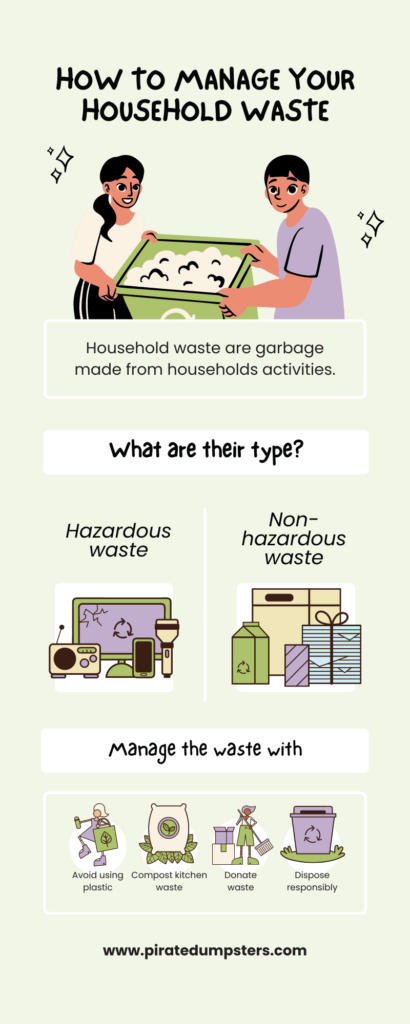
The amount of waste generated by households has increased significantly over the years, leading to various environmental problems such as landfills filling up quickly, pollution, and climate change. Proper management of household waste is essential to prevent these problems. By implementing the following tips, you can reduce waste and promote a sustainable environment.

The first step towards proper waste management is reducing waste at the source. This involves strategies such as:
Buying products in bulk: Purchasing items in large quantities reduces the amount of packaging and waste generated.
Say no to disposable items: Avoid using disposable items such as plastic cutlery, paper plates, and cups, and opt for reusable ones.
Use cloth bags: Use cloth bags instead of plastic bags when grocery shopping.
Compost food waste: Composting food waste reduces the amount of organic waste that ends up in landfills.
Another effective strategy for managing household waste is to repurpose or reuse items that would otherwise be thrown away. Here are some examples:
Use old clothes as rags: Old clothes can be used as rags for cleaning instead of disposable paper towels.
Donate items: Donate items such as clothes, furniture, and appliances that are still in good condition to charity organizations instead of throwing them away.
DIY projects: Get creative and use old items for DIY projects such as turning old jars into storage containers.
Recycling is one of the most effective ways to manage household waste. By recycling, we can reduce the amount of waste that ends up in landfills and conserve natural resources. Here are some tips for proper recycling:
Know what can and cannot be recycled: Check your local recycling guidelines to know which materials are recyclable.
Clean and dry recyclables: Rinse containers and dry them before recycling.
Keep recycling bins accessible: Keep recycling bins in a convenient and accessible place to encourage proper recycling.
Composting is the process of breaking down organic waste, such as food scraps, yard waste, and other natural materials, into a rich soil-like substance that can be used as a fertilizer for plants. Composting is a great way to manage household waste because it reduces the amount of waste that ends up in landfills, and it creates a valuable resource that can be used to nourish gardens and lawns.
To compost at home, you’ll need a compost bin or pile, which can be made from a variety of materials, including wood, plastic, or wire mesh. You’ll also need a mixture of brown materials, such as dried leaves or shredded paper, and green materials, such as food scraps and grass clippings. By layering these materials and adding water, air, and occasional turning, the composting process begins.
The benefits of composting are numerous. In addition to reducing waste and creating a valuable resource, composting also helps to enrich the soil, improve water retention, and reduce the need for chemical fertilizers.
Hazardous waste is any material that can be harmful to human health or the environment if not disposed of properly. Examples of hazardous waste commonly found in the household include batteries, fluorescent bulbs, cleaning products, and pesticides.
To dispose of hazardous waste safely, it’s important to follow the guidelines set by your local government or waste management agency. Many communities offer hazardous waste collection events, where you can drop off your materials for safe disposal. It’s important to never mix hazardous waste with regular household trash or pour it down the drain, as this can lead to contamination of water sources and harm to wildlife.
Managing household waste isn’t just an individual effort – it’s a community effort. There are many ways to get involved in community efforts to manage waste, such as participating in local recycling programs, volunteering at a waste reduction event, or joining a community garden. By working together, communities can make a significant impact on waste reduction and environmental sustainability.
The benefits of community involvement include a sense of community pride and accomplishment, the opportunity to learn new skills, and the ability to make a positive impact on the environment.
Donating items that are still in good condition to local charities or thrift stores is a great way to reduce waste and give back to the community. Instead of throwing away items that are no longer needed or wanted, consider donating them to a charity or thrift store where they can be sold or given to someone in need.
Many charities and thrift stores accept a wide variety of items, including clothing, furniture, electronics, and household goods. By donating these items instead of throwing them away, we can extend their useful life and reduce the amount of waste that ends up in landfills.
In addition to reducing waste, donating to local charities and thrift stores also helps those in need. The items donated are often sold at a low cost or given away to individuals or families who may not have the means to purchase them otherwise. This can help to provide essential items such as clothing and household goods to those who may be struggling financially.
Proper waste management is crucial for protecting the environment and our health. By implementing the above tips, we can all make a significant impact in reducing the amount of waste that ends up in landfills. At Pirate Dumpsters, we offer reliable and affordable dumpster rental services to help you manage your household waste. Contact us at 310-678-0503 for more information on our services and how we can help you manage your waste effectively. Let’s work together to make our planet a cleaner and healthier place for generations to come.